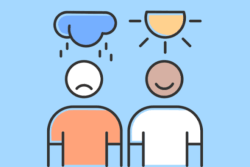With winter quarter quickly approaching and the weather changing from bright, warm days to rainy, cloudy grays, students are beginning to feel the pressure of navigating school, adjusting to campus life and fighting seasonal depression. Fortunately, seasonal depression looks a little different for UC Santa Barbara students.
Seasonal Affective Disorder (S.A.D.) is a recognized form of depression that typically starts in the fall or winter and improves in the sunnier days of spring and summer. It can be especially overwhelming for students who grew up in warmer climates and have to endure the abrupt transition to snowy, wet and, let’s be honest, gloomy weather. This is not to say that students attending California colleges do not also feel the effects of the change in seasons with academic stress and colder temperatures impacting mental well-being. UCSB students just tend to feel such changes differently.

The clocks turned back one hour, and sunny Santa Barbara is dark as early as 5 p.m. Studies, like Dr. Jesse Bracamonte’s, have shown that reduced light during the winter induces neurochemical changes in the brain, which increase fatigue. Melatonin is a hormone that is secreted in response to darkness by the enigmatic pineal glandis. This hormone induces sleep, which can help to explain why we feel more tired in the winter seasons as the days are shorter and the sun sets earlier. Daylight saving can further affect our bodies’ serotonin levels, causing our moods, sleep cycles and general attitudes to fluctuate. Research explains that when sunlight enters your eyes, it activates receptors in the retina that signal the brain to make serotonin. This chemical helps manage mood, emotional balance, appetite and digestion. This helps to explain why depression can be caused by an imbalance of neurotransmitters and many antidepressant medications are selective serotonin reuptake inhibitors, which prevent serotonin from being reabsorbed after the body uses it. With students’ daily sunlight intake depleting, it is understandable for moods to be lower and general anxiety to increase, only adding to the consistent stress of classes, homework and midterms.
Further, the University of California functions on the quarter system, posing UCSB students with the unique challenge of completing what others have months to master in a small, 10-week period. This academic stress is felt strongly by students across the UC schools as they race to ace midterms every three weeks and prepare for next quarter’s classes at a demanding and rigorous pace. Adjusting to this lifestyle while fighting seasonal depression can be very challenging for students; recent reports show that the percentage of UC students seeking mental health services has increased three times faster than enrollment growth over the last 10 years, rising by 78%.
However, UCSB, the school by the Pacific, offers a few perks that can help alleviate the anxieties of academics and the depression associated with changing seasons. It has been observed that the color blue is associated with feelings of calmness, creativity and peacefulness. According to some analyses, fixing your gaze on the ocean horizon can induce a mild meditative state by shifting the frequency of our brainwaves towards theta wavelengths. Negative ions from the air given from an extra electron in oxygen atoms in places near the ocean contribute to this chemical change in the brain. The noise of the waves can help to activate our parasympathetic nervous system, which is proven to slow our brains down and put us in a more relaxed mood.
Lastly, UCSB’s bustling campus culture and social life is a promising anecdote for seasonal depression. According to Harvard Health, social connections can help regulate the nervous system: The trust and support characteristic of meaningful friendships help reduce blood pressure and stress hormones to their baseline levels. Instead of being on edge and living in your mind of daily stressors and negative thoughts, friends and social outings can help to regulate the chemicals in your brain, leading you to feel more at ease and boost your mood. Whether it be for a Blenders In The Grass date, a band show in Isla Vista or a group hangout in your dorm, UCSB’s roaring social life can actually help fight the depression that accompanies the changing seasons.
While seasonal depression is a very real mental health issue that affects students in states from New Jersey to California, thanks to the neurological benefits of sunshine, ocean and community, UCSB students have a strong network of available resources for support. So, as winter quarter approaches and temperatures dip, stay connected, seek sunlight when you can and take care of your mental well-being — brighter days are ahead, Gauchos!
A version of this article appeared on p.8 of the November 20, 2025 edition of the Daily Nexus.




















